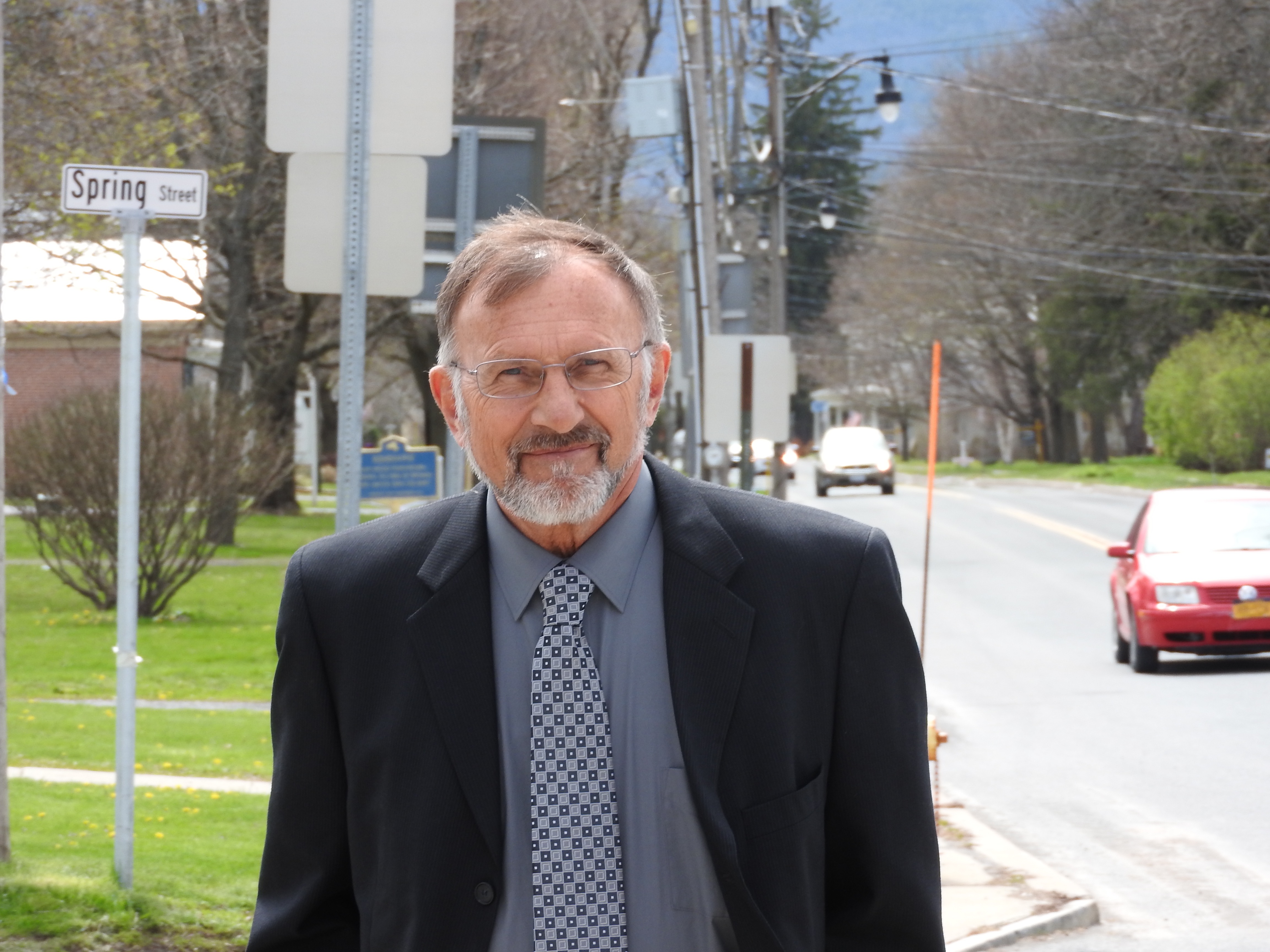
Calvin Harris confers with attorneys as they exit the courthouse in Schoharie for their lunch break. Pictured, from left, is defense attorney Donna Aldea, Harris, and defense attorney Bruce Barket. (Photos by Wendy Post)

Pictured is Terry Laber, a retired blood spatter analyst from the Minnesota Bureau of Criminal Apprehension who testified on Thursday for the defense.
Thursday saw the second day of defense witness testimony in the fourth second-degree murder trial for Calvin Harris in Schoharie County. On Wednesday, the day centered on arguments and the finalizing of loose testimony before the prosecution rested by mid-day and the defense began calling witnesses.
One argument that was resolved on Wednesday surrounded prosecution claims that a defense investigator persuaded one of their witnesses, Gregory Farr, to plead the fifth.
On Wednesday, family members of Gregory Farr were called in for a hearing to determine if defense investigator calls to the home of Farr’s relatives following his testimony last Friday was persuasive, or coercive.
Gregory Farr’s father arrived to testify, but the judge, at the end of the day, determined that Gregory Farr in a voice recording with his mother did not sound scared, and Judge Richard Mott therefore allowed the testimony given by Farr prior to his pleading the fifth to remain stricken from the record.
The prosecution was also attempting to get testimony of Francine Harris into evidence, and was allowed to re-read her testimony from the third trial to the court.
Once these things were resolved, the defense proceeded with their testimony by calling two of the Harris children, 18-year old Jenna and 22-year old Taylor to the stand to offer testimony that their father did not behave as if their mother was gone, and of how he kept photos of Michele, and kept her memory alive for them.
On Thursday, the defense continued to call witnesses, but was having a hard time bringing them in.
The first witness, Robert DelGiorno, served as an investigator on the Harris case in 2001 and interviewed Michele’s hairdresser. Despite efforts during this trial and the previous trial by the defense, they cannot locate DelGiorno, and he is not cooperating with requests to testify.
Another witness, who knew Stacey Stewart, was requested to testify but reported he was having a rough day, health-wise, and could not come into court.
The defense did, however, bring their bloodstain expert Terry Laber back to the stand for the fourth trial to testify about the analysis of bloodstains and what their pattern means.
Laber, a retired blood spatter analyst from the Minnesota Bureau of Criminal Apprehension, testified on Thursday that there would have been more blood spatter and evidence of force if the blood in the Harris home came from a fatal assault.
Laber also described, using a visual aide, the ways that spatter is formed. Laber depicted the movement and creation of spatter by utilizing his own blood for this presentation.
As one example, Laber dropped one drop of blood on a single drop of blood, and showed, through this presentation, how it created close to 80 bloodstains around it.
He also produced a demonstration that depicted the creation of impact stains, in which a hard object strikes blood.
Laber’s testimony continued throughout the afternoon in the trial.
On Friday, the defense was hoping to bring in two witnesses in from Texas, with one being Julie Brinkman, a former friend of Stacey Stewart’s who arrived to testify during the third trial.
As of noon on Thursday the defense, however, was not optimistic that they would be able to bring them in on Friday.
The defense is also continuing to try and locate and bring in Stacey Stewart to testify. When asked by the court what the problem seemed to be, other than locating Stewart, the defense stated, “It’s not liking sending out a dinner invitation and expecting an RSVP.”
All together, the defense hopes to bring in 12 witnesses, with Kevin Tubbs expected to testify on Tuesday.
Tubbs is the farmer who claimed to have seen Michele Harris arguing with a man other than Calvin Harris at the end of the family’s driveway in the early morning hours of Sept. 12, 2001 – hours after the prosecution claimed that Harris murdered her.
Withstanding any additional and extended arguments, the defense could potentially wrap up their presentation of witnesses by the end of next week. Both the defense and the prosecution, at that time, will present their closing arguments before handing things over to Judge Richard Mott who has maintained a swift, and controlled courtroom for these proceedings.


